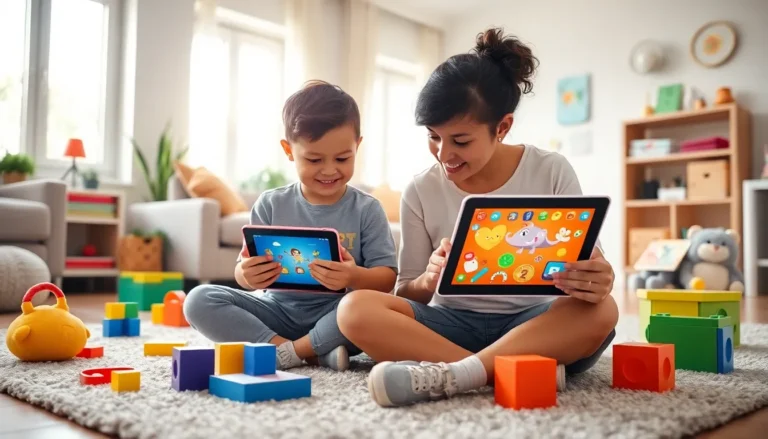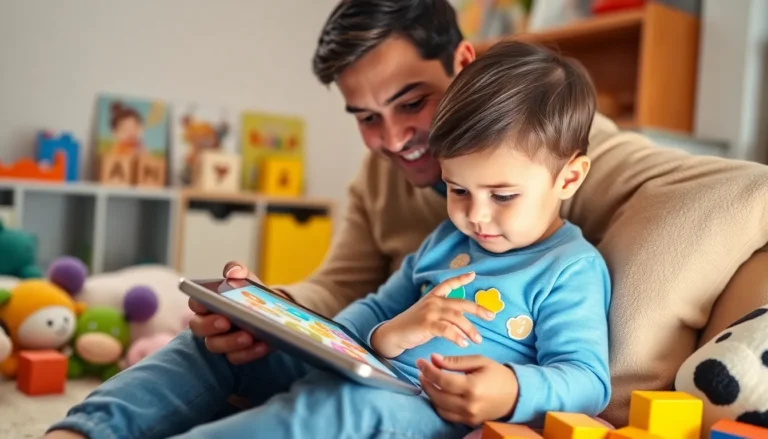Have you ever found yourself pondering the nuances between solo parenting and single parenting? It sounds like a straightforward topic, but it’s more complex than a toddler’s tantrum. In the grand theater of parenting, the roles can get muddled. The term ‘solo parenting’ often seems sexier, like a new drink on the menu, but is it? Or is single parenting the traditional staple, akin to a grilled cheese sandwich? Let’s wade through the jargon and get straight to the heart of the matter. By the end of this article, you’ll be armed with insights that make the term ‘parental juggling act’ feel like an understatement.
Table of Contents
ToggleDefining Solo Parenting and Single Parenting

When it comes to navigating the world of family dynamics, understanding definitions can make all the difference. Solo parenting refers to the situation where one parent is solely responsible for their child’s upbringing without the direct involvement or support of another parent. Typically, this scenario arises from choices like adoption or surrogacy, where the individual takes on the entire parenting role alone. On the other hand, single parenting generally describes parents who have ended a marriage or partnership and are raising their children independently. In this case, the other parent may still exist in some capacity but isn’t actively involved in the daily parenting processes.
So, while both solo and single parenting depict scenarios where one parent is in charge, the path to becoming a solo parent can involve very different circumstances than those faced by a single parent.
The Key Differences Between Solo and Single Parenting
Understanding how these two terms differ is crucial, as a clearer distinction helps in addressing the unique challenges each arrangement presents. One key difference lies in support systems. Solo parents often design their own support structure, creating networks that might include friends, family, and community resources, whereas single parents may receive varying levels of involvement from their child’s other parent.
Financial responsibilities also differ. Usually, solo parents bear the complete brunt of costs associated with raising a child, from diapers to college funds, while single parents may share these expenses with their former partners.
Besides, emotional dynamics play a role. Solo parents navigate the high seas of parenting without a backup captain, which can be rewarding yet isolating. In contrast, single parents might deal with co-parenting challenges and the complexities of their former relationship, which can define their parenting experience in unique ways.
Finally, consider parenting styles. A solo parent may develop their own unique approach, never having to compromise with a co-parent, while a single parent might be juggling two parenting philosophies, one from each parent.
Challenges Faced by Solo Parents
Flying solo in the parenting arena can present numerous challenges. From sheer workload to emotional hurdles, solo parents often encounter a variety of obstacles.
Time Constraints: Managing every aspect of day-to-day life posed the biggest hurdle. Solo parents juggle work, errands, school activities, and the joyous chaos known as bedtime without the help of a partner. The result? Limited free time for self-care or personal enjoyment.
Isolation: Emotional isolation can creep in. With no partner to share burdens or joys with, solo parents might find themselves feeling like they’re navigating uncharted waters, alone.
Financial Strain: The financial burden often rests exclusively on the shoulders of a solo parent. From rent or mortgage to groceries, every bill falls to them, causing stress and impacting quality of life.
Finally, solo parents frequently experience the challenge of decision-making, handling not only everyday decisions but also significant life choices without the input of another parent.
Challenges Faced by Single Parents
Life as a single parent comes with its own set of unique challenges. While the need to manage daily tasks remains, the emotional landscape changes significantly.
Co-Parenting Dynamics: The emotional ups and downs from co-parenting can be extremely stressful. Negotiating responsibilities and dealing with differing opinions on child-rearing can add tension to an already challenging situation.
Balancing Relationships: Single parents often find themselves striving to maintain a balance between their parental responsibilities and their social lives. After all, romance doesn’t just stop when you have kids (though the number of babysitters might.).
Financial Challenges: Like solo parents, single parents can face significant financial challenges, especially if child support or alimony is inconsistent. Juggling bills can feel like a circus act without the clown music, yet many single parents still manage to pull off the impossible.
Benefits of Solo Parenting
Even though challenges, solo parenting comes with its own bright side.
Autonomy: Solo parents enjoy the freedom to make decisions without compromise. From choosing bedtime routines to dietary guidelines, they have the luxury of creating an environment that suits their unique family style.
Strong Bonds: The one-on-one time spent between a solo parent and their child often fosters deep emotional connections. They learn to rely on each other, leading to strong, lasting relationships.
Personal Growth: Solo parenting encourages tremendous personal growth. Through navigating daily challenges, solo parents develop resilience, resourcefulness, and adaptability, qualities that serve them and their children well.
Benefits of Single Parenting
Single parenting, too, comes with its own positive aspects.
Co-Parenting Potential: Good co-parenting can lead to shared responsibilities, easing the burden on one individual. This often encourages children to maintain relationships with both parents, which can be beneficial for their emotional development.
Broader Support Networks: Many single parents can tap into extended family and community resources for support. This network often helps provide childcare or emotional support, creating a more rounded experience for both parent and child.
Diversity of Influence: Children raised by single parents can gain varied perspectives, learning from both parents’ different views. The influence of two contrasting parenting styles can equip kids with valuable social skills.
Tips for Navigating Parenting in Both Scenarios
Whether a parent finds themselves in a solo or single parenting situation, navigating these waters can be tricky, but here are some practical tips:
- Build Support Networks: Whether through family, friends, or local parenting groups, having allies can provide support during tough times.
- Practice Self-Care: Prioritizing personal time is essential. Communicate needs to friends or family members so they can lend a hand when needed.
- Stay Organized: Use calendars or planning apps to keep track of schedules, appointments, and milestones. Organization reduces anxiety and promotes smoother days.
- Honest Communication: In co-parenting situations, clear communication is key. Setting ground rules and sticking to them can ease tensions.
- Focus on Quality Time: Whether solitary or partnered, nothing beats quality time together. Engage in activities that your child enjoys, fostering stronger connections.








